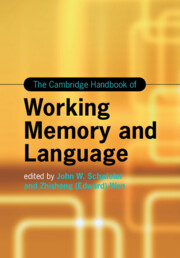Crossref Citations
This Book has been
cited by the following publications. This list is generated based on data provided by Crossref.
Biedroń, Adriana
and
Véliz-Campos, Mauricio
2021.
Facing Diversity in Child Foreign Language Education.
p.
39.
Wen, Zhisheng (Edward)
Teng, Mark Feng
Han, Lili
and
Zeng, Yong
2022.
Working Memory Models and Measures in Language and Bilingualism Research: Integrating Cognitive and Affective Perspectives.
Brain Sciences,
Vol. 12,
Issue. 6,
p.
729.
Horne, Autumn
Ding, Junhua
Schnur, Tatiana
and
Martin, Randi
2022.
White Matter Correlates of Domain-Specific Working Memory.
Brain Sciences,
Vol. 13,
Issue. 1,
p.
19.
Zhang, Yuyang
Yang, Jing
and
Wen, Zhisheng (Edward)
2022.
Learners with Low Working Memory Capacity Benefit More from the Presence of an Instructor’s Face in Video Lectures.
Journal of Intelligence,
Vol. 11,
Issue. 1,
p.
5.
Han, Lili
Wen, Zhisheng (Edward)
and
Runcieman, Alan James
2023.
Interpreting as Translanguaging.
O’Grady, William
and
Lee, Miseon
2023.
Natural Syntax, Artificial Intelligence and Language Acquisition.
Information,
Vol. 14,
Issue. 7,
p.
418.
Hitch, Graham J.
Allen, Richard J.
and
Baddeley, Alan D.
2025.
The multicomponent model of working memory fifty years on.
Quarterly Journal of Experimental Psychology,
Vol. 78,
Issue. 2,
p.
222.
Mahshanian, Amir
Shahnazari, Mohammadtaghi
and
Moinzadeh, Ahmad
2025.
Investigating the Relationship Between Working Memory, Semantic Encoding, and L2 Reading Ability Across Proficiency Levels.
Journal of College Reading and Learning,
Vol. 55,
Issue. 1,
p.
63.


